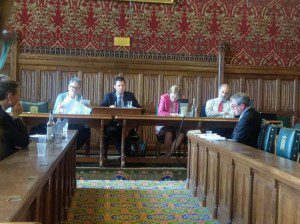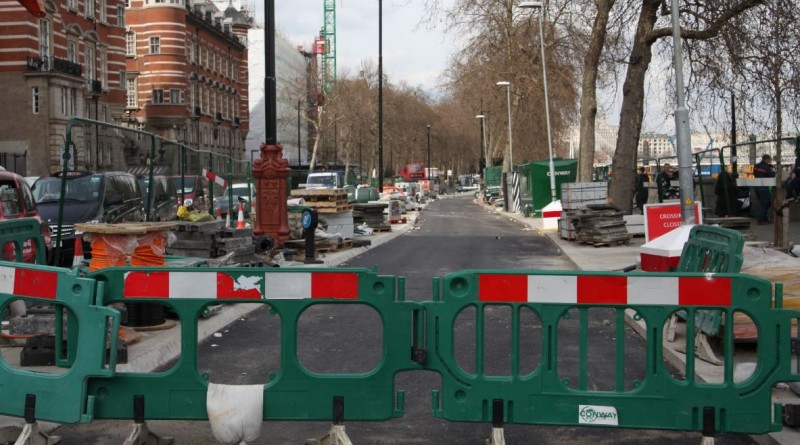Editor’s Comment: UK DfT Minister shows why cycling strategy is on a road to nowhere under his guidance
Yesterday afternoon the All Party Parliamentary Cycling Group met within the House of Lords with a view to driving forward cycling policy, funding and overall ambition.
In attendance was Olympic hero turned Cycling advocate Chris Boardman, MPs from various parties, policymakers with the CTC and Sustrans and DfT minister Robert Goodwill, among others. The meet fell on the day of the deadline of the Cycling and Walking Investment Strategy, which has been described by many as no strategy at all, primarily due to the outer London funding pot of approximately £300 million.
Over 4,000 responses have been filed as part of the consultation, so we expect the Government will be hearing loud and clear that cyclists are unsatisfied with proposals. Is £300 million enough to not only design cycling out of danger, but to actively incentivise active travel through sensible routes in and out of towns and cities? Considering a single ‘mini Holland’ has to date cost around £30 million to install, we’d suggest the figure falls well short of expectation. Another way of looking at things is to compare cycling’s budget to other transport spend, but then you’d really get annoyed.
Chris Boardman has described the figure as “derisory” in the past and yesterday British Cycling’s policy adviser spent much of his time constructively hypothesizing solutions to grow that size of the funding pot.
“In Germany they have a 2p fuel duty which trickles back into cycling, such a thing would go a long way to achieving our £10 a head minimum target,” said Boardman.
Hypothetical scenarios are, however, just that and Goodwill would not be drawn on what he described as a “sensitive issue” of tax on fuel.
In the past these meets have produced such positive outcomes as the 18 recommendation Get Britain Cycling report, but yesterday’s meet (the first i’d personally sat in on) is highly unlikely to produce such positive results.
Unfortunately, yesterday also marked another black day for UK cycling in that a young woman was killed by a HGV, or more specifically someone driving one, in Croydon.
At the very close of yesterday’s meet, Robert Goodwill suggested that we need to better understand why women aren’t cycling, parting with a jibe about appearance concerns due to helmet use. At the time it’s unlikely that anyone in the room had heard of the incident on St James’ Road, but it’s safe to say that Goodwill’s remark was met with disapproval in the room. Helmet hair is most certainly not a key reason why women and children in particular are not taking to the road. Vulnerability on the roads, among many other things, most certainly is up there on the list. 
Goodwill did suggest that the Government were looking at key performance indicators to get more women and other groups cycling, but no commitment was made and things quickly petered out.
In fact, Goodwill made a series of poorly judged remarks during a relatively short appearance yesterday and some felt a little personal.
Suggesting that the perception of fear might be blamed on media coverage of cycling fatalities, as well as remarking that journalists will always criticise spend and demand more from the current funding pot seemed particularly counterproductive remarks.
I can’t be sure, but I believe I heard the minister mumble that he wouldn’t be made to feel guilty for spending substantial sums on other transport projects when challenged on cycling’s low spend. Fair enough, however…
I, nor any of my other colleagues in the bike or mainstream media, should be made to feel guilty for calling for better than the bare minimum for cycling.
If CTC calculations are correct (and i suspect they are), cycling will soon be contending with as little as 72p per head, while road funding enjoys £86 a head. At a time when we’re contending with record pollution, congested roads and numerous inactivity related health crises, the Government’s strategy seems to be to dig the hole as deep as possible before taking action.
When asked if funding for cycling was sufficient, Goodwill replied: “The key word here is sufficient, I don’t think by many people’s standards funding will ever by sufficient, especially in the real world where there’s a deficit to contend with.”
Goodwill’s own department knows the facts and figures on cycling’s benefit to cost ratio, having produced a document titled ‘The Value of Cycling’. Within this cycling was shown to have a positive net return on everything from health to house prices.
Contradiction did, however, become the theme of  the day.
the day.
“When myself and Chris (Boardman) went cycling together in Europe I asked the Dutch Ambassador what we should be doing. They said we should have started 30 years earlier.”
Outside of the “beacon for cycling” that is London, Goodwill blamed devolution of power to local authorities as a reason why progress is likely to remain slow for the foreseeable future. On the design guidelines that might help councils drive cycling standards upwards, the minister stated that the DfT would revise signage guidelines, but that no specific national cycling design standards would be coming soon, instead continuing to fall within wider transport guidance.
According to Stop Killing Cyclists campaigner Donnachadh McCarthy, the unambitious 2040 goal to double national modal share from 2 to 4% of trips won’t stand a chance with this strategy.
Writing to the group’s Facebook page, McCarthy wrote: “There are about 85,000 km of major non-motorway roads needing dutch-standard cycle lanes. (leaving out the 300,000 km of C and unclassified local roads).
“Thus the new supposed national cycling strategy funding would build 37 km of dutch standard cycle lanes/year or 0.04% of the roads needing them.
“By 2040 at this rate it would have built 888 km of protected cycle lanes or 1% of the roads needing them.
“Goodwill’s national cycling ‘strategy’ would reach Dutch standards by the year 4,313 (i.e. in 2,297 years).”
Another telling soundbite suggested the Minister remains quite uncertain on the reality of cycling’s status in the world rankings.
“We may be behind Europe in cycling funding per capita, but we may be okay per cyclist,” said the minister. “We’re on par with other cycling nations in the EU.”
When pressed on which EU states Goodwill said he was unsure, but would report back shortly.
That about summarises the funding segment of the discussion, which unfortunately at present is the egg to the chicken. As it stands and given the lengths Goodwill has thus far gone to avoid meeting issues head on, it may be a while yet before that bird hatches and spreads its wings.
A report based on the CWIS feedback and yesterday’s evidence session will now be published in early June.



